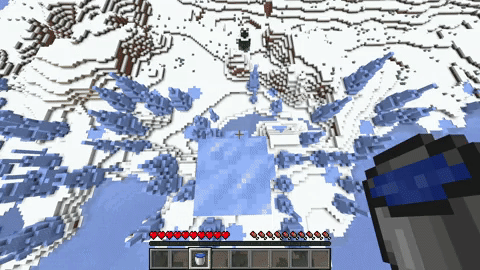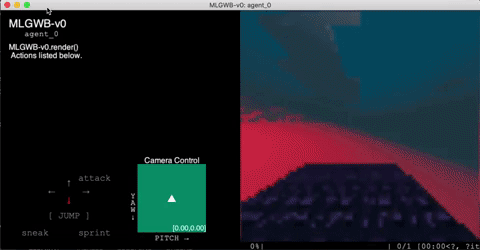Creating A Custom Environment
Introduction
MineRL supports many ways to customize environments, including modifying the Minecraft world, adding more observation data, and changing the rewards agents receive.
MineRL provides support for these modifications using a variety of handlers.
In this tutorial, we will introduce how these handlers work by building a simple parkour environment where an agent will perform an “MLG water bucket jump” onto a block of gold.
“An MLG water is when a player is falling out of the air, or when a player jumps off of something, and they throw down water before they hit the ground to break the fall, and prevent themselves from dying by fall damage.” –Sportskeeda

The agent will then mine this gold block to terminate the episode.
See the complete code here.
Setup
Create a Python file named mlg_wb_specs.py
To start building our environment, let’s import the necessary modules
from minerl.herobraine.env_specs.simple_embodiment import SimpleEmbodimentEnvSpec
from minerl.herobraine.hero.handler import Handler
import minerl.herobraine.hero.handlers as handlers
from typing import List
Next, we will add the following variables:
MLGWB_DOC = """
In MLG Water Bucket, an agent must perform an "MLG Water Bucket" jump
"""
MLGWB_LENGTH = 8000
MLGWB_LENGTH specifies how many time steps the environment can last until termination.
Contruct the Environment Class
In order to create our MineRL Gym environment, we need to inherit from SimpleEmbodimentEnvSpec. This parent class
provides default settings for the environment.
class MLGWB(SimpleEmbodimentEnvSpec):
def __init__(self, *args, **kwargs):
if 'name' not in kwargs:
kwargs['name'] = 'MLGWB-v0'
super().__init__(*args,
max_episode_steps=MLGWB_LENGTH,
reward_threshold=100.0,
**kwargs)
reward_threshold is a number specifying how much reward the agent must get for the episode to be successful.
Now we will implement a number of methods which SimpleEmbodimentEnvSpec requires.
Modify the World
Lets build a custom Minecraft world.
We’ll use the FlatWorldGenerator handler to make a super flat world and pass it a
generatorString value to specify how we want the world layers to be created. “1;7,2x3,2;1”
represents 1 layer of grass blocks above 2 layers of dirt above 1 layer of bedrock. You can use websites
like “Minecraft Tools” to easily customize superflat world layers.
We also pass a DrawingDecorator to “draw” blocks into the world.
def create_server_world_generators(self) -> List[Handler]:
return [
handlers.FlatWorldGenerator(generatorString="1;7,2x3,2;1"),
# generate a 3x3 square of obsidian high in the air and a gold block
# somewhere below it on the ground
handlers.DrawingDecorator("""
<DrawCuboid x1="0" y1="5" z1="-6" x2="0" y2="5" z2="-6" type="gold_block"/>
<DrawCuboid x1="-2" y1="88" z1="-2" x2="2" y2="88" z2="2" type="obsidian"/>
""")
]
Note
Make sure create_server_world_generators and the following functions are indented under the MLGWB class.
Set the Initial Agent Inventory
Lets now lets use the SimpleInventoryAgentStart handler to give the agent a water bucket and a diamond pickaxe.
Lets also make the agent spawn high in the air (on the obsidian platform) with the AgentStartPlacement handler.
def create_agent_start(self) -> List[Handler]:
return [
# make the agent start with these items
handlers.SimpleInventoryAgentStart([
dict(type="water_bucket", quantity=1),
dict(type="diamond_pickaxe", quantity=1)
]),
# make the agent start 90 blocks high in the air
handlers.AgentStartPlacement(0, 90, 0, 0, 0)
]
Create Reward Functionality
Lets use the RewardForTouchingBlockType handler
so that the agent receives reward for getting to a gold block.
def create_rewardables(self) -> List[Handler]:
return [
# reward the agent for touching a gold block (but only once)
handlers.RewardForTouchingBlockType([
{'type':'gold_block', 'behaviour':'onceOnly', 'reward':'50'},
]),
# also reward on mission end
handlers.RewardForMissionEnd(50)
]
Construct a Quit Handler
We want the episode to terminate when the agent obtains a gold block.
def create_agent_handlers(self) -> List[Handler]:
return [
# make the agent quit when it gets a gold block in its inventory
handlers.AgentQuitFromPossessingItem([
dict(type="gold_block", amount=1)
])
]
Allow the Agent to Place Water
We want the agent to be able to place the water bucket, but SimpleEmbodimentEnvSpec
does not provide this ability by default. Note that we call super().create_actionables()
so that we keep the actions which SimpleEmbodimentEnvSpec does provide by default (like movement, jumping)
def create_actionables(self) -> List[Handler]:
return super().create_actionables() + [
# allow agent to place water
handlers.KeybasedCommandAction("use"),
# also allow it to equip the pickaxe
handlers.EquipAction(["diamond_pickaxe"])
]
Give Extra Observations
In addition to the POV image data the agent receives as an observation, lets provide
it with compass and lifestats data. We override create_observables just like the previous step.
def create_observables(self) -> List[Handler]:
return super().create_observables() + [
# current location and lifestats are returned as additional
# observations
handlers.ObservationFromCurrentLocation(),
handlers.ObservationFromLifeStats()
]
Set the Time
Lets set the time to morning.
def create_server_initial_conditions(self) -> List[Handler]:
return [
# Sets time to morning and stops passing of time
handlers.TimeInitialCondition(False, 23000)
]
Other Functions to Implement
SimpleEmbodimentEnvSpec requires that we implement these methods.
# see API reference for use cases of these first two functions
def create_server_quit_producers(self):
return []
def create_server_decorators(self) -> List[Handler]:
return []
# the episode can terminate when this is True
def determine_success_from_rewards(self, rewards: list) -> bool:
return sum(rewards) >= self.reward_threshold
def is_from_folder(self, folder: str) -> bool:
return folder == 'mlgwb'
def get_docstring(self):
return MLGWB_DOC
Congrats! You just made your first MineRL environment. Checkout the herobraine API reference to see many other ways to modify the world and agent.
See complete environment code here.
Using the Environment
Now you need to solve it 🙂
Create a new Python file in the same folder.
Here is some code to get you started:
You should see a Minecaft instance open then minimize. Then, you should see a window that shows the agent’s POV.
import gym
from mlg_wb_specs import MLGWB
# In order to use the environment as a gym you need to register it with gym
abs_MLG = MLGWB()
abs_MLG.register()
env = gym.make("MLGWB-v0")
# this line might take a couple minutes to run
obs = env.reset()
# Renders the environment with the agent taking noops
done = False
while not done:
env.render()
# a dictionary of actions. Try indexing it and changing values.
action = env.action_space.noop()
obs, reward, done, info = env.step(action)
See complete solution code here (Python file) or an interactive version here (Jupyter Notebook).
